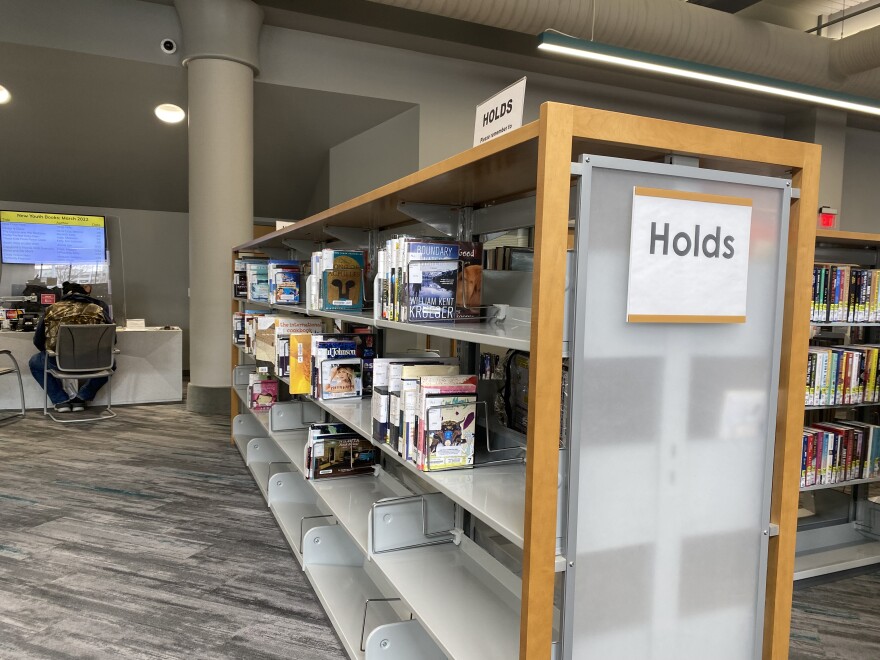Public libraries across the country are eliminating overdue fines and clearing patrons of their debt as a way to encourage more readers to revisit the library.
Wichita Public Library officials hope to do the same thing here.
The library’s board of directors recently approved a proposal to do away with late fees on books and other items. The Wichita City Council will have the final say on the plan during budget talks this summer.
But if you ask Jaime Prothro, the city’s new library director, the change is overdue.
“It’s really something that is based in the fundamentals of how libraries have always lived, which is about making sure that everybody has access,” Prothro said.
“We’re looking at how we can re-engage members of the community who aren’t using us regularly — or haven’t over the course of many years.”
About half of Wichita residents have library cards. But more than 42,000 are currently blocked from checking out materials because they owe more than $10 in fees.
When library officials mapped those fines by address, they learned that households in low-income areas of the city owed the most. That means late fees are driving away groups who stand to benefit the most from free resources, Prothro said.
“A lot of communities are looking at the financial and racial equity that this kind of change can have,” she said.

More than three-fourths of children in the Wichita school district qualify for free or reduced-price lunch, which is an indicator of poverty. Prothro said eliminating library fines could help early literacy efforts, which benefits the whole community.
“When we did outreach to schools and talked with students, their parents were often preventing them from getting that card because of the worry about the financial overhead of borrowing,” she said.
“Part of our drive is to make sure that more books are in more hands, always,” Prothro said. “So that kindergartners are ready to read, third-graders are reading at grade level, more people are graduating from high school and earning livable wages. … It’s a long-tail decision.”
Under Wichita’s current fee structure, the library charges 25 cents a day for most items past their due date. Blu-rays and DVDs cost $1 a day.
That may not sound like much. But if you visit the library with several children and they each check out several books, late fees can pile up quickly.
“One of the … philosophies behind this is to really recognize that people have lives. People have busy lives, and the library's role is to eliminate as many barriers as possible so that people can freely and, without worry, be able to borrow,” Prothro said.
According to the Urban Libraries Council, nearly every state in the country has at least one public library that has gone fine-free.
The Kansas City Public Library dropped overdue charges in 2019 with a policy it calls “Freedom from Fines.” That same year, the American Library Association issued a resolution calling fines a form of “social inequity” and urged libraries to find a way to eliminate them.
In October, the Wichita library system eliminated the 25-cent hold fee to reserve a book or transfer it to a different branch. Prothro said more people are searching the online catalog and placing more holds.
If late fees are eliminated, patrons would still have due dates for materials they check out. But they’d have a two-week grace period to return the item without penalty. After that, they’d be required to return the item or pay a replacement fee to check out more materials.
“It really does shift the worry away from our borrowers, as far as, “I'm gonna make a mistake in my life, and then owe money.’ I think that everybody hates that,” Prothro said.
Eliminating overdue fines would cut the library’s revenue by about $13,000 a year, she said. But fines represent only about 5% of the library’s overall budget, Prothro says, and the benefits for both patrons and library staff would outweigh the financial hit.
After a Colorado library system eliminated overdue fines in 2015, officials reported that 95% of materials were returned within a week of their due date.
Another plus: Amnesty from late fees might get patrons to bring back nearly 30,000 unreturned items, which are valued at more than $570,000.
“We want to be the busiest place in town,” Prothro said. “It’s the only place in our city where you aren't expected to spend money. You can come in here, pluck a book off the shelf and just sit here and enjoy. You’re welcome here.”


